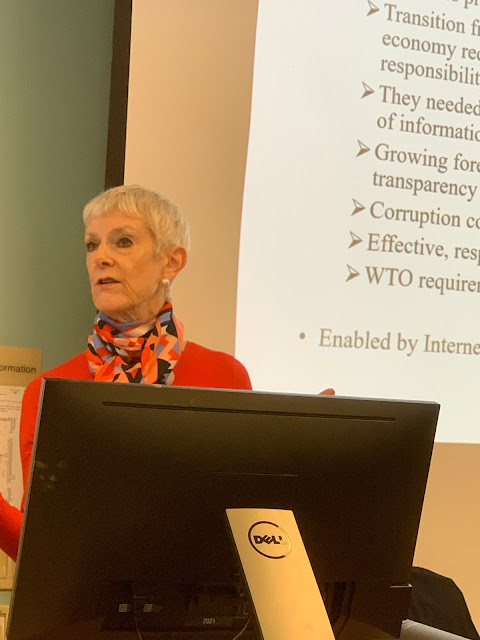I was delighted to have participated in a Lecture delivered at Penn State by Jamie Horsley. Entitled "China's Information Enterprise: From Freedom of Information to Social Credit to Data Governance," the lecture re-situated the project of Chinese social credit within the larger frameworks of information security, trust in markets, data governance, and admonistrat8ve policy in China.
The presentation, "China's Information Enterprise: From Freedom of Information to Social Credit to Data Governance," focused on four major points, the insights of which were quite profound:
1. Chinese history of archiving and managing records within a culture of official secrecy;
2. China's Freedom of Information Act (FOIA): Launched nationwide in 2008 as part of a larger "open government" project;
3. China's Social Credit System; launched nationally in 2014 as a disclosure based regulatory initiative; and
4. China's data governance regime: development and the great issue of open data regimes versus sovereignty and security concerns.
The entire lecture is quite rich and worth careful consideration. Some highlights for me: (1) the centrality of record keeping cultures; in China revolving around the state; in the West around the accounting for business; (2) the evolving tensions between open government programs and the impulse to protect sensitive information; (3) the sometimes quite significant difference between governmental data governance and social credit regimes, and those run by private entities (like Sesame Credit); (4) the connection between the open government policy and the essence of Reform and Opening Up and its information requirements; (5) the role of the New Era 'informationalization' and e-government programs; (6) for linguists--the close connection between trust and credit which provides nuance to the term social credit-social trust and its character; (7) the connection between trust-credit and the construction of a compliance culture (here converging with trajectories in the liberal democratic west); (8) the current contradictions between data security/proteciton and development in an age of informatics; (9) the ramifications of China's Global Initiative on Data Security and principles of data sovereignty.
Jamie Horsley is a visiting fellow in the John L. Thornton China Center in the Foreign Policy program at Brookings and a Visiting Lecturer in Law and Senior Fellow of the Paul Tsai China Center at Yale Law School. Her project work and research revolve primarily around issues of administrative law, governance and regulatory reform, including promoting government transparency, public participation and government accountability. She was formerly Executive Director of the Yale China Law Center. Prior to joining Yale, she was a partner in the international law firm of Paul, Weiss, Rifkind, Wharton & Garrison; Commercial Attaché in the U.S. Embassies in Beijing and Manila; Vice President of Motorola International, Inc.; and a consultant to The Carter Center’s China Village Elections Project. She holds a B.A. from Stanford University, an M.A. in Chinese Studies from the University of Michigan, a J.D. from Harvard Law School, and a Diploma in Chinese Law from the University of East Asia. She was a Fellow at the Woodrow Wilson International Center for Scholars for 2015-16.
The video Recording of the lecture (along with PowerPoint) may be accessed here.

No comments:
Post a Comment